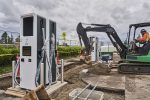
$623 Million Awarded from Biden Administration to Build out 7,500 EV Chargers in 22 States
The Biden administration has recently allocated $623 million in grants to support the development of an extensive electric vehicle (EV) charging network across the United States. The announcement, made on Thursday, outlines the funding for 47 EV charging stations and related projects spanning 22 states and Puerto Rico. The initiative aims to establish 7,500 EV charging ports, addressing the critical need for accessible and convenient charging infrastructure.
Transportation Secretary Pete Buttigieg emphasized the historical role of the United States in the automotive industry and expressed the opportunity to lead the global EV revolution. The funding is expected to contribute to job creation in charger manufacturing, installation, and maintenance, benefiting American workers.
The funding is part of the $7.5 billion approved by Congress in the 2021 infrastructure law to fulfill President Joe Biden’s objective of establishing a national network comprising 500,000 publicly available chargers by 2030. These charging ports play a pivotal role in Biden’s broader strategy to incentivize a shift away from gasoline-powered vehicles, thereby addressing concerns related to global warming.
Despite the ambitious goals, progress on the EV charging network has been gradual. Only Ohio and New York have opened charging stations under the National Electric Vehicle Infrastructure program, while other states, including Pennsylvania and Maine, have initiated federally funded projects set to open this year.
Since Biden assumed office in 2021, EV sales have surged, surpassing 1 million units in the previous year—a fourfold increase. The number of publicly available charging ports has also grown substantially, reaching 168,426, which is approximately one-third of the target set for 2030.
To overcome barriers to EV adoption, such as “range anxiety” and concerns about charging infrastructure, the administration is taking steps to make chargers more widespread and easily accessible. The funding includes $311 million for 36 “community” projects, benefiting urban and rural areas, including schools, parks, libraries, and apartment buildings. Additionally, $312 million will be directed towards 11 highway “corridors” designated as Alternative Fuel Corridors.
The grants encompass a range of projects, from boosting EV charging and hydrogen fueling infrastructure in various communities to building state-of-the-art truck charging sites in California’s San Joaquin Valley. Notably, $70 million will be allocated to the North Central Texas Council of Governments to establish hydrogen fueling stations for medium- and heavy-duty freight trucks.
The commitment to supporting clean energy infrastructure extends to Maryland, where $15 million will fund the construction of 87 EV charging stations in urban, suburban, and low- and moderate-income communities. This includes sites such as Coppin State University in Baltimore, underscoring the administration’s emphasis on inclusivity and accessibility in the transition to electric transportation.
Despite challenges, Buttigieg and administration officials remain optimistic about the accelerating trajectory toward achieving the goal of 500,000 chargers by 2030. They believe that the electric vehicle revolution is already underway, with EVs representing about 9% of all passenger vehicle sales—a significant increase since Biden took office. Buttigieg cited a study indicating that EVs cost just 4% more than traditional gasoline-powered cars, signaling a potential shift in the affordability of electric vehicles.
Source: Associated Press

